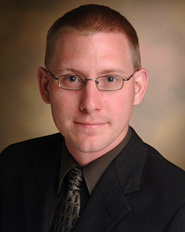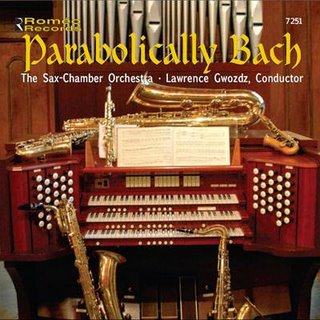
Alan Theisen (b. 4 October 1981; Port Huron, Michigan) is a Ph.D. graduate assistant in the Department of Music Theory at the Florida State University.
Composing since the age of sixteen, he has produced a steadily growing body of work distinguished by its musical energy and concentration of expression.
Representative works by Theisen include a Sonata for Alto Saxophone and Piano, Variations on a Theme of Gretchaninov, Eclogue for flute, and the Concerto for Alto Saxophone and String Orchestra (premiered by soloist Lawrence Gwozdz and the Szczecin Philharmonic in 2004). Recent compositions and commissions include Ritorno for flute and cello and a Triple Concerto. Noted composer Dimitri Terzakis commends Theisen's oeuvre as being "the product of a unique talent."
As a saxophonist, Theisen has toured the United States and Canada with the Sax-Chamber Orchestra, performing at two World Saxophone Congresses (Montreal - 2000, Minneapolis - 2003). He studied the instrument with internationally-recognized performer Lawrence Gwozdz and participated in masterclasses with famed saxophone pioneer Jean-Marie Londeix. No stranger to the podium, Theisen has been a guest conductor with several ensembles.
In an effort to showcase both his own original compositions and pieces by other contemporary composers, he founded the Intégrales New Music Festival in 2005. Now an annual event, Intégrales NMF features world-premiere performances by nationally recognized musicians. Intégrales has expanded to include musical collaborations with artists, authors, and dancers.
Theisen wrote his undergraduate thesis on György Ligeti's Piano Etudes, and has authored several papers on topics including Elliott Carter, film editing, composition as analysis, and Michael Brecker.
Other interests include mathematics, film criticism, and philosophy; in addition, Theisen has performed the role of Oberon in a production of Shakespeare's A Midsummer Night's Dream, for which he also wrote the incidental music.
Theisen lives with his wife (and puts up with their two cats) in Tallahassee, Florida.
|
|
|
|
|
|

Saturday, June 10, 2006
The Sax-Chamber Orchestra
 I am pleased to announce the release of the University of Southern Mississippi Sax-Chamber Orchestra's latest disc, Parabolically Bach. I am pleased to announce the release of the University of Southern Mississippi Sax-Chamber Orchestra's latest disc, Parabolically Bach.
The Sax-Chamber Orchestra is distinguished not only by its superb musicianship but by its unique sound concept as well. Members of the orchestra play saxophones and mouthpieces that are designed according to the original 19th-century specifications of the instrument's inventor, Adolphe Sax. The resulting timbre is dark, organ-like, and acoustically resonant - entirely unlike the stereotypical "edgy" sound heard so frequently these days on the radio and in the concert hall. The older models of saxophones and mouthpieces utilized by the S-CO embody Sax's brilliant concept of a parabolic instrument bore. As time went by, modern instrument makers altered Sax's designs to such a point that the unique parabolic structure of the instrument vanished and was replaced with a conical structure. Consequently, the beautiful and mellifluous timbre imagined by Sax was supplanted by an uncharacteristic tone quality that blended poorly with other instruments (prompting some musicians and critics, such as John-Edward Kelly, to actually call contemporary saxophones "saxophone-like instruments").
Fortunately, the Sax-Chamber Orchestra uses the original set-ups crafted by the Belgian master (which can be heard on Parabolically Bach).
The following pieces are contained on the CD: Toccata and Fugue in D Minor, BWV 565; Prelude and Fugue in G Minor, BWV 558; Prelude and Fugue in D Minor, BWV 554; Wie schön leuchtet der Morgenstern, BWV 739; Chorale from Cantata BWV 140 - Wachet auf, ruft uns die Stimme; Jesu bleibet meine Freude from Cantata BWV 147; O Haupt voll Blut und Wurden from the St. Matthew Passion, BWV 244; Chorale and Opening Chorus from Cantata BWV 99, Was Gott thut, das ist wohlgethan; Ricercare á 6 from The Musical Offering, BWV 1079; Prelude and Fugue XXII from The Well-Tempered Clavier, Book 1, BWV 867; Contrapunctus I from The Art Of The Fugue, BWV 1080; and Brandenburg Concerto No. 6, BWV 1051.
The disc may be purchased from Qualiton Imports.
posted by Alan Theisen
|
| |



